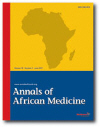
|
Annals of African Medicine
Annals of African Medicine Society
ISSN: 1596-3519
Vol. 4, Num. 2, 2005, pp. 92-93
|
Untitled Document
Annals of African Medicine, Vol. 4, No. 2, June, 2005, pp. 92-93
THE MRC CRASH STUDY: ANY LESSONS FOR US?
E. O. Komolafe, 1M. A. Komolafe and 2B. B. Shehu
Departments of Surgery and 1Medicine Obafemi Awolowo
University Teaching Hospital, Ile Ife, Osun State and 2Department
of Surgery, Usmanu Danfodiyo University Teaching Hospital, Sokoto, Nigeria E-mail: adeyoyin2001@yahoo.com, eokomolafe@hotmail.com
Code Number: am05024
Dear Editor
It is now known that corticosteroid use in head trauma is not beneficial
and may actually contribute to increase morbidity and mortality in the head
injured patients. This is due to the efforts of the just concluded MRC
CRASH (Corticosteroid Randomisation After Significant Head Injury) study.1 Apart
from putting to rest the controversy surrounding the use of steroids in the
management of head injury, the study further gave insights into the pathophysiology
of intracranial hypertension.2
There are some lessons to be learnt from the CRASH study which we believe
will assist in future research works, particularly in Africa. These include:
A multicentre international
collaborative work especially with a large sample is possible, even in
emergency settings. This is aided by advancement and spread in communication
facilities particularly the internet and telephone services which made
communication easier and quicker among the collaborators, a well designed
grail method3, appropriate and adequate trial coordination,
as well as adequate funding. Governments, institutions, foundations,
societies and willing individuals should be encouraged to provide the
necessary funds
needed for such work.
- Common disease condition
of global impact that affect all irrespective of race, colour, tribe,
religion, social status, age, sex, etc. are better studied and understood
by combined
international efforts. It will be good if this type of study can be extended
to other medical conditions in the nearest future, especially those peculiar
to Africa. Studies tailored for the paediatric patient should also
be considered rather than transposing the results from adult studies
to the
children.
- Success of research works
involve multidisciplinary contributions from expert specialists, even
those that might not be primarily involved in the management of the condition
being studied such as epidemiologists and statistician.
- We should always question
a known, common and usual treatment modality even if such is widely
accepted and practiced because our foundation for such practice may be false
and
such interventions may be harmful. Therefore there is the need for
constant reviews (audit) of our practice.
- Adequate, constant and
regular data monitoring during the study is essential so that the trend
of data
could be followed up closely and the study can be stopped early if
necessary as in CRASH 1 study where it was found that the intervention
is harmful.
- What we think is important
in a disease condition may not be right as in the first CRASH study. Many
people thought steroid use is the main stay of treatment of the head
injured and sometimes may neglect other basic supportive care that
has stood the
test of time.
- Institution of a collaborative
group that understand themselves, have a focus, united and experienced
will go a long way in the success of any study.
Bearing these in mind will assist us in other studies. Epidemiology,
natural history, and peculiarities of management and outcome of disease
conditions will be better understood. Previous experiences will also help
to minimize cost, the stress accompanying the study and the study may be
completed in record time. In the recently conducted CRASH study only four
countries in Africa participated. It is time also that Africa take up
similar challenges and be more involved in researches that will impact
on health care delivery in the continent.
References
- Roberts I, Yates D, Sandercock
P et al. Effect of intravenous corticosteroids on death within 14 days
in 10008 adults with clinically significant head injury (MRC CRASH trial):
randomized placebo-controlled trial. Lancet 2004; 364(9442): 1321-1328
- Sauerland S, Maegele A. A
CRASH landing in severe head injury. Lancet 2004; 364 (9442): 1291-1292
- Roberts I. Design of CRASH
trial. Trial is best way to elucidate effectiveness of corticosteroids
in acute severe head injury. BMJ 1999; 319 (7216): 1069
Copyright 2005 - Annals of African Medicine
|
